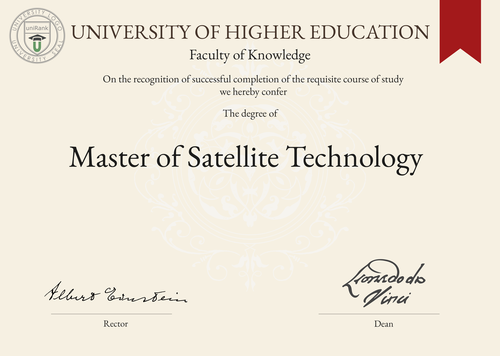
Master of Satellite Technology (MST)
Guide to Master of Satellite Technology Program/Course/Degree
Master of Satellite Technology (MST)

Program Name
Master of Satellite TechnologyProgram or Degree abbreviation
MSTDuration range
The duration of the program typically ranges from 1 to 2 years.Tuition range
The tuition fees for the program vary depending on the chosen country and university. Please refer to the respective university websites for specific information.Overview
The Master of Satellite Technology program is designed to provide students with a comprehensive understanding of satellite technology and its applications. It covers various aspects of satellite systems, including design, operation, communication and data analysis.Curriculum Overview by year
- Year 1: Introduction to Satellite Technology, Satellite Communication Systems, Satellite Design and Engineering, Satellite Data Analysis - Year 2: Advanced Satellite Systems, Satellite Navigation and Remote Sensing, Satellite Applications in various industries, Research ProjectKey Components
The key components of the program include theoretical knowledge, practical skills and research experience. Students will gain a deep understanding of satellite technology, develop technical expertise in satellite systems and have the opportunity to work on real-world projects.Career Prospects
Graduates of the Master of Satellite Technology program can pursue various career paths in the satellite industry. They can work as satellite engineers, satellite system designers, satellite communication specialists, remote sensing analysts, or satellite data scientists. Opportunities exist in government agencies, aerospace companies, telecommunications firms, research institutions and more.Salary Expectations
The salary expectations for graduates of the Master of Satellite Technology program can vary depending on factors such as location, industry, job role and level of experience. Generally, professionals in this field can earn competitive salaries, with the potential for growth as they gain more experience and expertise. For a more accurate understanding of salary expectations, you can utilize the Job Sites Search Engine, from our sister site jobRank, which searches over 4,600 job sites worldwide. Make sure to specify not only the job title but also the country you are interested in.Conclusions:
It is important to note that the duration, tuition fees, curriculum, key components, career prospects and salary expectations of the Master of Satellite Technology program can vary based on the chosen country or location of study, as well as the specific university offering the program. Prospective students are advised to research and compare different universities and their offerings to find the best fit for their educational and career goals. Visitors interested in pursuing a Master of Satellite Technology degree can search for universities offering this program worldwide through the uniRank World Universities Search Engine. This search engine provides a comprehensive database of universities and their programs, allowing individuals to explore their options and make informed decisions about their education.World Universities Search Engine
search for Master of Satellite Technology (MST) and add the Location (country, state etc.) or specific University you are interested in studying at.
Query examples:
- Master of Satellite Technology (MST) United States
- Master of Satellite Technology (MST) United Kingdom online
- Master of Satellite Technology (MST) Australia international students
- Master of Satellite Technology (MST) University of California
- Master of Satellite Technology (MST) University of London tuition fees
- Master of Satellite Technology (MST) University of Sydney scholarships
Share Program/Course
Interesting? Share this program/course/degree info with your friends now.